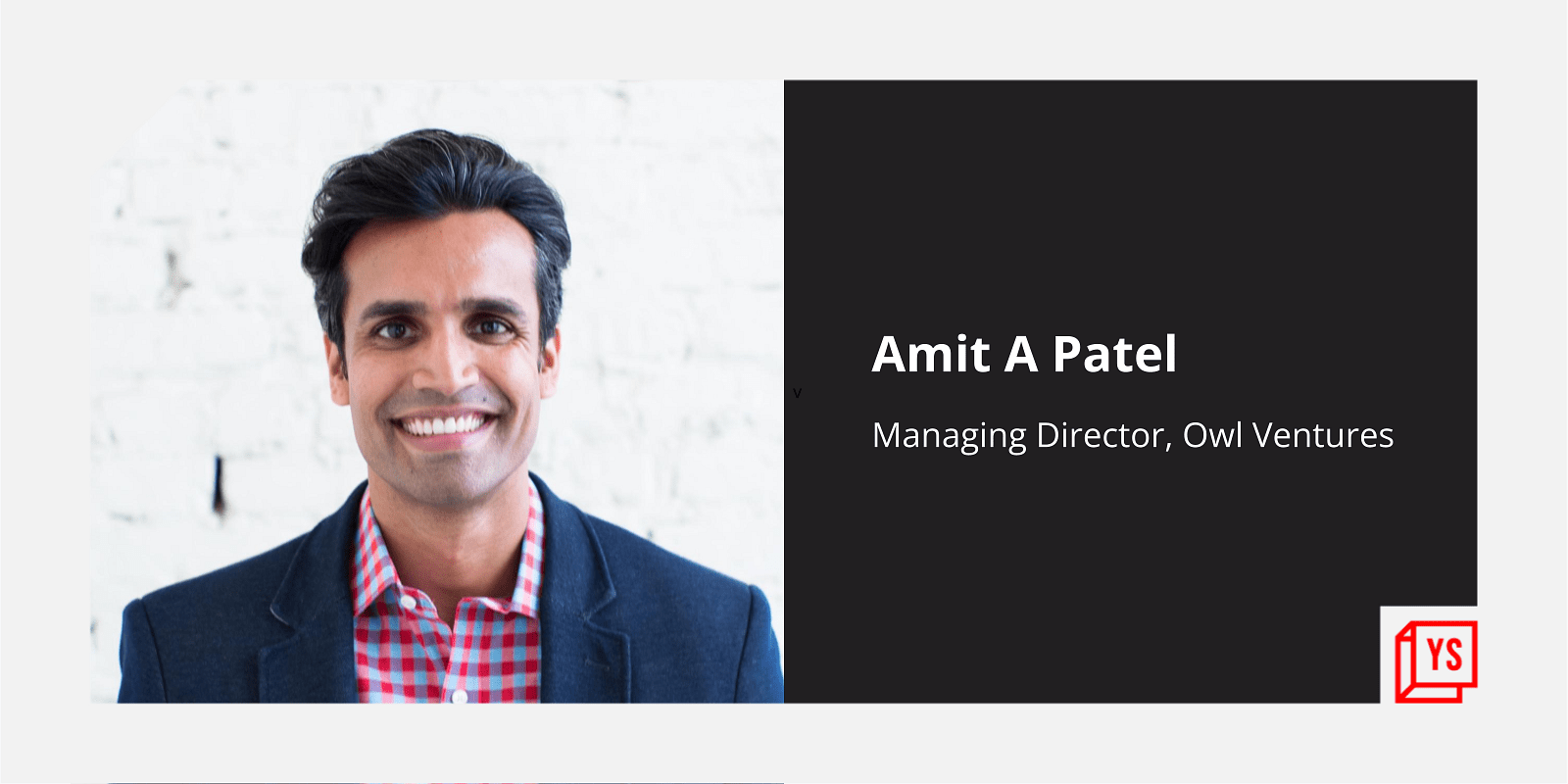Owl Ventures, a Silicon Valley venture-capital firm that focuses entirely on education technologies (edtech), has closed more than $1 billion across three funds.
Its latest funds comprise $640 million under the Owl Ventures’ fifth fund, $270 million under its second Opportunity Fund, and more than $100 million in special purpose vehicles.
Owl Ventures, which was founded in 2014, has 65 ventures in its portfolio with $2 billon of assets under management. These include unicorn companies such as Apna.co and BYJU’S from India, Degreed, Greenlight, MasterClass, Newsela, Quizlet, and Stash.
It has also invested in other Indian startups like Leap Finance, and SplashLearn. Owl Ventures had invested in BYJU’S in early 2019, which acquired Whitehat Jr — another Owl Ventures investment — less than a year later.
In this interview to YourStory, Owl Ventures’ Managing Director Amit A Patel delves into the VC fund’s origin, the segments in edtech that are growing fast, and how the pandemic has made online learning a must-have for educators and learners.
Edited excerpts from the interaction –
YourStory (YS): Is Owl Ventures looking at India, given that less than 10 startups of its global portfolio are from India?
Amit A Patel: India is definitely an area of focus for us. When it comes to education technology, we believe that India is going to be the epicentre of innovation.
There is the opportunity within India to build a large education technology company that serves the domestic market, but also to create a company that serves an international audience.
India is home to one of the largest STEM (science, technology, engineering and math) graduate populations in the world. As companies become more global, and demand for talent increases, India is certainly a country where all companies are looking to recruit.
There is also a number of opportunities for upskilling and reskilling, apart from the K-12 companies in India.
Second, India is also home to one of the largest English-speaking populations in the world. This means the ability to create companies from India that can serve a global audience. Companies can have teachers or instructors who are based in India that are actually teaching students around the world.
The third thing we have seen, which is really impressive, is just the entrepreneurial talent — the speed with which they move, how quickly they innovate, and how fast they find product-market fit.
So, India is certainly a market that we will continue to be excited about and invest in.
YS: What are the contours of the companies in the Owl Ventures portfolio?
Amit: The thing about education is the desire to find great education experiences, and the desire to remain competitive in the digital economy of today — upskilling and reskilling — is a universal need.
So, we are seeing demand for our companies that have products on a global scale. Similarly, we are seeing innovation happen globally as well.
“BYJU’S is a great example of a company that has built large demand for a product in the Indian ecosystem. But, they have also seen tremendous international demand for their products.”
Similarly, we have a company called Labster that is based in Denmark, which is providing AR (augmented reality) and VR (virtual reality) lab experiences and simulation for students. They serve higher-education institutions all over the world.
Then, we also have companies that are based in the US, like Quizlet. It is serving students within the US, but also has learners that have leveraged their products in hundreds of countries around the world.
Another great example is Amira Learning, which has been recognised by Time magazine as one of the top 100 inventions of 2021. This venture is helping individuals who want to become more fluent in reading abilities be able to do that. They brought in AI technologies to help learners in early and elementary stages start to become more confident and fluent in their English-reading abilities.
We are seeing companies in the sector that are becoming international, some that are international at inception like Leap Finance. They are working with students from India that want to study abroad, helping them access loan or financial services to make that experience happen. We are starting to see that more often.
YS: How has Owl Ventures seen the interest in edtech evolve among limited partners?
Amit: When we started the fund, our thesis was based on the significant opportunity for many decades to come in the education sector.
It was estimated to be $6 trillion in 2021. This makes education the second-largest sector after healthcare. Currently, only 2 percent to 3 percent of that is digital.
According to estimates, the size of education in the next decade will be between $10 trillion and $20 trillion. There has been a significant amount of investments that have been made by countries around the world that have made this an interesting time to invest in the sector.
A lot of this has to do with, first and foremost, the significant amounts of investments in connectivity as well as devices getting into the hands of people.
Data rates are continuing to become much more affordable. With mobile data or through high-speed broadband internet connections, people can get access to the tech infrastructure that these products leverage.
The second thing is: as people are starting to think about having a 50-year career, the idea of having to upskill and reskill is becoming important to stay competitive and relevant in the job market.
There is a real desire to continue to learn well beyond K-12 schooling, as well as higher education. For that reason, there is a tremendous amount of opportunities in education solutions that serve adult learners, and individuals who are returning to education later on in life to reskill and upskill.
The other thing we are starting to see are interesting opportunities in the edtech+ sector. This is the intersection of other major sectors like fintech or health-tech. We see a massive $6 trillion industry like education intersect also with the creator economy among other sectors.
YS: What are the companies in your portfolio that are focused on adult-learners?
Amit: There is Apna.co from India, which helps blue-collar and grey-collar workers find a job and in careers transition. There is also Masterclass in the edtech+ category at the intersection of edtech and entertainment. There is Stash, which is edtech+ fintech that helps individuals learn about investing and being financially literate.
Mighty Networks is helping a lot of folks to create online courses, and build online communities. Degreed is helping companies figure out the available skills among their employees, and how they should be thinking about their upskilling and reskilling in line with the employees’ career goals.
YS: How has the pandemic impacted edtech?
Amit: No matter what needs-group you are talking about, remote learning or online learning programmes for K-12 and even universities were nice-to-have, rather than must-haves, before the pandemic.
All of this has brought education technology companies front and centre — and made it a critical part of the ecosystem. It has advanced the adoption of edtech solutions, and increased the number of learners worldwide in every product category.
In our portfolio, the underlying metrics of companies is impressive in revenue growth and users growth, apart from other business fundamentals, which points to the fact that these are solutions that are addressing real needs for educators as well as learners.
These solutions are here to stay.
YS: How much headroom do you see for companies like Byju’s in India, given that the transacting user-base in India tends to plateau after the 120-million territory?
Amit: The opportunity is absolutely massive. BYJU’S has certainly expanded the offering. The core product that they started off with is focused on the K-12 sector. Now, they continue to grow with the acquisition of Great Learning, and a number of companies in the international market as well.
YS: Given BYJU’S has acquired so many companies, what do you make of this kind of consolidation?
Amit: We are seeing activity begin to pick up in the edtech sector. Last year, there were a number of companies that went public. There are several reports that the coming decade will see a ten times increase in the number of edtech companies that cross the $1-billion valuation, or which will go in for a public markets listing, compared to 10 years ago.
There is a number of investors and capital that is beginning to pay attention to edtech. This presents interesting funding opportunities for companies. We believe Owl Ventures is in the beginning stages of a massive opportunity for decades to follow.
Any vibrant ecosystem needs three key ingredients: the entrepreneurs to start companies, capital to be coming in to fund those companies, and the exits or acquisitions for follow-on funding to happen for the sector to continue to attract entrepreneurs.
We are starting to see all of those key pieces starting to come into place for edtech, and put that virtuous cycle or flywheel in motion.


![Read more about the article [Year in Review 2021] 7 apps that helped us sail through 2021](https://blog.digitalsevaa.com/wp-content/uploads/2021/12/apps1-1640847073756-300x150.png)







![Read more about the article [Funding alert] Financial services platform StrideOne raises Rs 250 Cr led by Elevar Equity](https://blog.digitalsevaa.com/wp-content/uploads/2022/05/MalvikaCopyofImageTagging92-1653926465424-300x150.png)